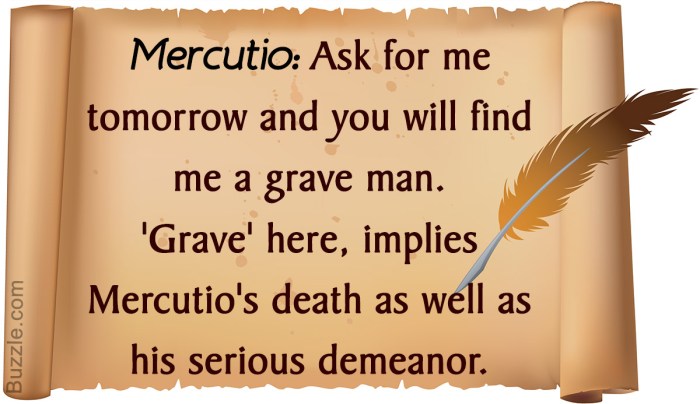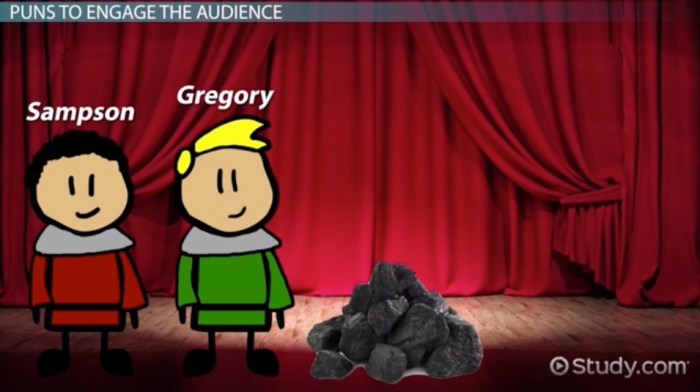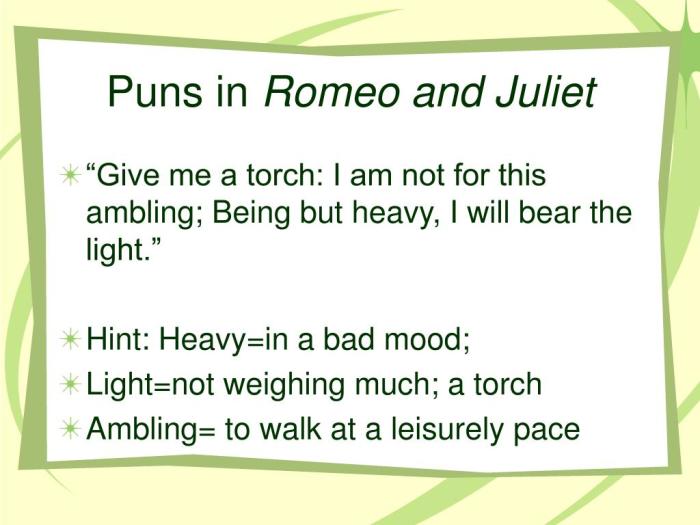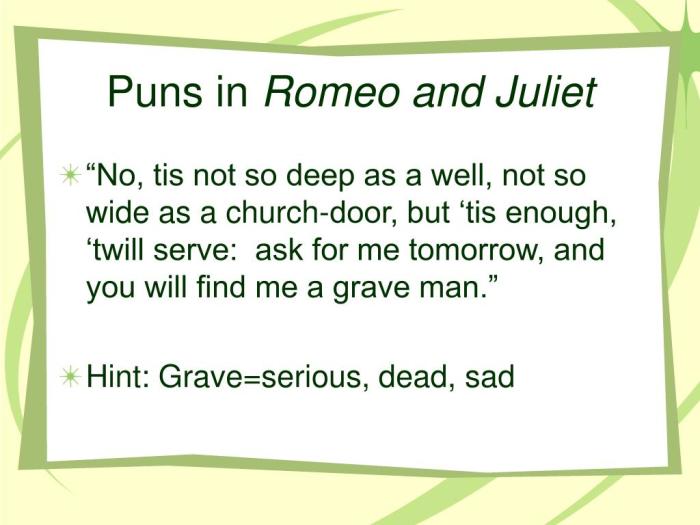Pun in romeo and juliet – Beginning with the puns in Romeo and Juliet, this article delves into the witty wordplay that enhances the play’s themes and characters. These puns not only provide comic relief but also offer insights into the characters’ emotions and motivations.
Throughout the play, Shakespeare employs puns to create humor, foreshadow events, and reveal character traits. By analyzing these puns, we gain a deeper understanding of the play’s language, its cultural context, and its enduring appeal.
Introduction

A pun is a humorous play on words that relies on the multiple meanings of a word or phrase. It can be used to create a clever joke or to emphasize a particular point.
Puns have been used in literature for centuries, and they were particularly popular during Shakespeare’s time. This was due in part to the fact that the English language was still in a state of flux, and there were many words that had multiple meanings.
As a result, puns were a way to add humor and complexity to a text.
Historical Context of Puns During Shakespeare’s Time
During Shakespeare’s time, puns were considered to be a sign of wit and intelligence. They were often used in plays and poems to create a humorous effect or to emphasize a particular point. Some of the most famous puns in English literature come from Shakespeare’s plays, such as the following:
“A rose by any other name would smell as sweet.”- Romeo and Juliet
“To be or not to be, that is the question.” – Hamlet
These puns are still used today, and they continue to be a source of humor and enjoyment.
In Romeo and Juliet, puns are used to create a light-hearted atmosphere amidst the tragedy. They also serve as a commentary on the characters’ immaturity and lack of understanding of the world around them. This is similar to the concepts explored in ap gov chapter 13 vocab , where the immaturity of the government and its citizens is often highlighted through political satire and humor.
In Romeo and Juliet, the puns emphasize the characters’ inability to fully grasp the consequences of their actions, just as the humor in ap gov chapter 13 vocab highlights the government’s inability to fully understand the needs of its citizens.
Pun in Romeo and Juliet

Examples and Purpose of Puns
Shakespeare’s use of puns in Romeo and Juliet adds humor and wit to the play, providing comic relief amidst the tragedy. Puns often highlight the play’s themes of love, fate, and identity.
- “My lips, two blushing pilgrims, ready stand to smooth that rough touch with a tender kiss.”(Act 1, Scene 5) – Romeo puns on the word “pilgrims,” which can refer to both religious travelers and his lips, emphasizing his eagerness to kiss Juliet.
- “If you prick us, do we not bleed? If you tickle us, do we not laugh? If you poison us, do we not die?”(Act 3, Scene 1) – Juliet uses a pun on the word “prick” to suggest that she is not afraid of Romeo’s sword, as she is already wounded by his love.
- “I will bite my thumb at them, which is a disgrace to them if they bear it.”(Act 1, Scene 1) – Tybalt puns on the phrase “bite my thumb,” which can mean both to insult someone and to indicate a challenge to a fight.
Role in Plot and Character Development
Puns also contribute to the play’s plot and character development. They can foreshadow events, create dramatic irony, and reveal characters’ personalities.
- The pun on “prick” foreshadows the tragic deaths of Romeo and Juliet, as they are both killed by swords.
- The pun on “bite my thumb” creates dramatic irony, as the audience knows that Tybalt’s challenge will lead to a fight, while the other characters do not.
- Romeo’s puns on love and desire reveal his passionate and romantic nature.
Overall, puns play a significant role in Romeo and Juliet, adding humor, highlighting themes, and contributing to the play’s plot and character development.
Literary Analysis of Puns: Pun In Romeo And Juliet

Puns in Romeo and Julietserve multiple literary purposes, including providing comic relief, highlighting character traits, and foreshadowing events.
Wordplay and Irony
Shakespeare employs wordplay and irony to create humorous puns that often reveal the characters’ true feelings or foreshadow future events. For instance, Mercutio’s pun, “If love be rough with you, be rough with love,” foreshadows the violent nature of Romeo and Juliet’s relationship.
Double Entendre
Double entendre, a type of wordplay that has two meanings, is also used to create puns. In the famous balcony scene, Romeo’s line, “It is my lady, O, it is my love! O, that I were a glove upon that hand, that I might touch that cheek!” has a double meaning: a glove would allow him to touch Juliet’s hand and cheek, but it would also symbolize his desire to be her lover.
Impact on Tone and Interpretation
The use of puns in Romeo and Julietcontributes to the play’s overall tone and interpretation. The puns provide moments of comic relief, lightening the mood of the tragic story. However, they also serve as reminders of the play’s central themes of love, fate, and death.
Comparison to Other Shakespearean Plays
Puns are a common feature in Shakespeare’s plays, but their use in Romeo and Julietis particularly notable. While puns are often used for comedic effect in his comedies, in Romeo and Juliet, they serve a more complex purpose, foreshadowing events and revealing character motivations.
Cultural and Historical Significance

Puns flourished in Elizabethan England, a period characterized by linguistic experimentation and wit. The court of Queen Elizabeth I was a hub for wordplay, and puns became a fashionable way to display one’s intelligence and wit.
Influence on Play’s Reception, Pun in romeo and juliet
The use of puns in Romeo and Julietreflects the cultural significance of puns during the play’s time. Puns added humor and depth to the play, enhancing its appeal to Elizabethan audiences. They also contributed to the play’s enduring popularity, as audiences continue to appreciate the clever wordplay.
Enduring Appeal
Puns remain popular in literature and popular culture today. Their ability to evoke humor, surprise, and delight makes them a versatile tool for writers and entertainers. Puns also challenge our expectations about language, encouraging us to think creatively and appreciate the nuances of communication.
Clarifying Questions
What is the significance of puns in Romeo and Juliet?
Puns in Romeo and Juliet serve multiple purposes, including providing comic relief, foreshadowing events, and revealing character traits. They add depth to the play’s language and enhance our understanding of the characters’ emotions and motivations.
How do puns contribute to the play’s themes?
Puns in Romeo and Juliet often relate to the play’s central themes of love, loss, and fate. By using wordplay and double entendre, Shakespeare explores the complexities of these themes and invites us to reflect on their universal significance.
Are puns commonly used in Shakespearean plays?
Yes, puns are a common feature in Shakespeare’s plays. He uses them to create humor, convey character, and advance the plot. However, the extent and nature of pun usage vary from play to play.